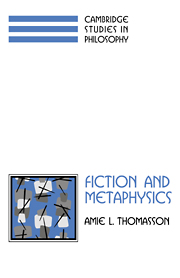Book contents
- Frontmatter
- Contents
- Acknowledgments
- Introduction: From Fiction Into Metaphysics
- Part One The Artifactual Theory of Fiction
- Part Two Ontological decisions
- Foreword
- 6 Fiction and experience
- 7 Fiction and language
- 8 Ontology and categorization
- 9 Perils of false parsimony
- 10 Ontology for a varied world
- Notes
- Bibliography
- Index
8 - Ontology and categorization
Published online by Cambridge University Press: 23 September 2009
- Frontmatter
- Contents
- Acknowledgments
- Introduction: From Fiction Into Metaphysics
- Part One The Artifactual Theory of Fiction
- Part Two Ontological decisions
- Foreword
- 6 Fiction and experience
- 7 Fiction and language
- 8 Ontology and categorization
- 9 Perils of false parsimony
- 10 Ontology for a varied world
- Notes
- Bibliography
- Index
Summary
I have argued that we can offer better analyses of experience and language by postulating fictional characters, but before deciding to admit them these benefits must be weighed against the ontological costs. It is generally supposed that these costs are high, for admitting fictional characters, it is thought, involves postulating a new category of extremely strange and unusual entities, thus taking on a large burden compared with the parsimony which could be maintained without them. These worries should be taken seriously but should not be left unexamined. Does admitting fictional characters require positing a strange new category of beings bloating an otherwise spare ontology? Do the costs in terms of parsimony outweigh the benefits gained in analyzing experience and discourse? To properly assess the ontological costs of admitting fictional characters we must step back to ask how we can make such ontological decisions in a principled and consistent manner rather than on the basis of vague fears or aesthetic preferences for what seems to be a sparser ontological landscape.
PIECEMEAL ONTOLOGY VERSUS CATEGORIAL ONTOLOGY
Ontology is a two-part venture. The first task is to lay out categories in which things might be claimed to exist, without commitment to whether or not such categories are occupied. The second task is that of assessing what there really is. Contemporary ontologists typically – although not always – focus exclusively on the second task and proceed on a one-by-one basis to argue for or against allowing certain kinds of things, be they numbers, universals, acts of consciousness, or fictional objects, into our ontology.
Information
- Type
- Chapter
- Information
- Fiction and Metaphysics , pp. 115 - 136Publisher: Cambridge University PressPrint publication year: 1998
